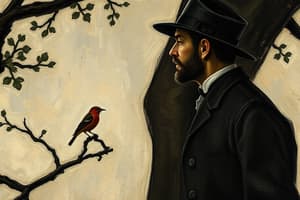Podcast
Questions and Answers
What are at least two matters of disagreement between Atticus and Aunt Alexandra?
What are at least two matters of disagreement between Atticus and Aunt Alexandra?
Aunt Alexandra disapproved of the children sneaking out, while Atticus was glad they did. Aunt Alexandra believes you shouldn't say in front of Negroes that Braxton Underwood despises them, but Atticus argues that everyone in Maycomb knows he does.
How does Atticus explain the mob's actions to Scout?
How does Atticus explain the mob's actions to Scout?
Atticus explains that everybody has a blind spot and that they are good men.
Why is Mr. Underwood covering Atticus at the jail despite being a known racist?
Why is Mr. Underwood covering Atticus at the jail despite being a known racist?
He wants to get the story.
Describe Mr. Dolphus Raymond's way of life and its effect upon the town.
Describe Mr. Dolphus Raymond's way of life and its effect upon the town.
What is the difference between Judge Taylor's appearance and his ability?
What is the difference between Judge Taylor's appearance and his ability?
Study Notes
Atticus and Aunt Alexandra's Disagreements
- Aunt Alexandra disapproves of the children's adventures, preferring strict behavior, while Atticus is supportive of their exploration.
- Aunt Alexandra is critical of Atticus's open discussions about race, particularly regarding Braxton Underwood's known racism, whereas Atticus believes such truths are already known in Maycomb.
Atticus on the Mob
- Atticus describes that everyone has personal biases or "blind spots," implying that even seemingly good individuals can act against their morals under pressure, such as during a mob's confrontation.
Mr. Underwood's Support
- Mr. Underwood, a known racist, chooses to cover Atticus at the jail likely to document the events, indicating a complex perspective on justice and truth that transcends his prejudice.
Mr. Dolphus Raymond's Lifestyle
- Mr. Dolphus Raymond is characterized by his drinking habits, often being intoxicated before noon, which shapes the town's perception of him as an outcast.
- His unconventional lifestyle, living with a black woman and having mixed children, challenges societal norms in Maycomb and contributes to town gossip and stigma.
Judge Taylor's Duality
- Judge Taylor presents an unkempt appearance that contrasts with his legal expertise, suggesting a disconnect between societal expectations of a judge and his personal demeanor.
- His appearance may stem from a deliberate choice to defy traditional norms, emphasizing his understanding of the law over public perception.
Studying That Suits You
Use AI to generate personalized quizzes and flashcards to suit your learning preferences.
Description
Explore key discussions and character disagreements in Chapter 16 of 'To Kill a Mockingbird' through this engaging quiz. Understand the contrasting viewpoints of Atticus Finch and Aunt Alexandra, highlighting their different values and beliefs. Perfect for students studying Harper Lee's classic novel.




